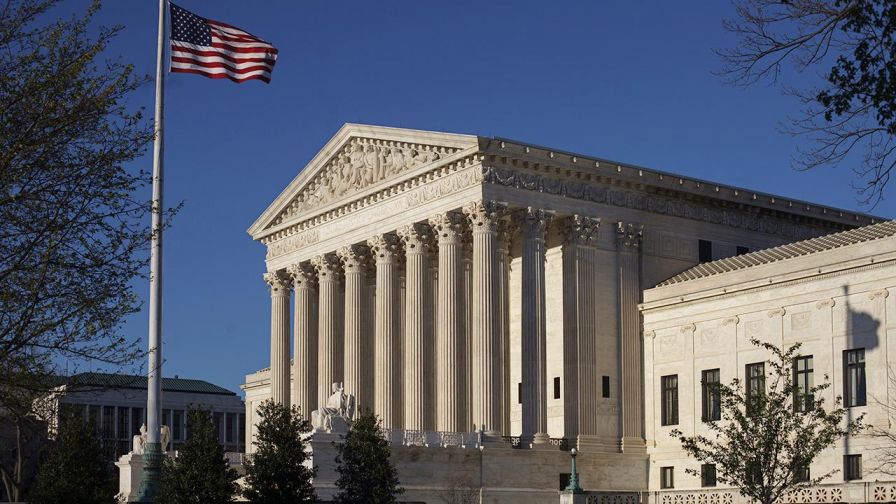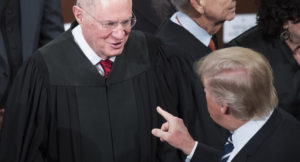Kennedy’s Retirement Could Give Radical Republicans Control of the Supreme Court for the Next 40 Years
Though the announcement had been anticipated for a long time, the news that Justice Anthony M. Kennedy is retiring arrived like a loud firecracker.
It’s incendiary because it means that we’re scrapping the last hopes of a swing court that actually balances reason, empathy and human rights. Indeed, we’re on the verge of a 40-year rule of the nation’s laws by a very conservative majority.
It’s explosive because we’ve been depending on the courts to rein in Trump’s most extreme, most inhumane executive orders and actions against immigrants and voters, and even more, when the special counsel investigation of Trump-Russia reaches the point of needing clout in holding the presidency to the force of law.
The Kennedy news serves as an immediate call to arms for Democrats, women, gays and consumers to rise to the barricades to do anything possible to slow, if not stop, another Trump conservative appointee to the Supreme Court. The president reacted immediately to say he will look to his list of 25 men and women put forth by the Heritage Foundation, among others, as candidates who will fit with his increasingly conservative political thinking.
At least one thing is clear: Democrats have just gained a consolidating election issue for November.
I’ve been unhappy all week with the release of end-of-year decisions by the court, all by 5-4 decisions.
Bad enough are the court’s:
- Upholding the anti-Muslim travel ban;
- Removing a law that patients need not be given counsel about alternatives for ending pregnancies;
- Overturning laws in 23 states that allowed unions to gather collective bargaining fees from the minority of federal and state workers in this case who oppose union positions.
What really has me agog is the prospect of a nonstop, continuing attack on the status quo for a return to pro-business, anti-abortion, Republican-dictated social solutions turned into law.

In effect, the Supreme Court has become a reverse Legislature, overturning laws that the conservative majority finds objectionable.
The glue in all this has been the addition to the court of Justice Neil M. Gorsuch, after Senate Majority Leader Mitch McConnell had refused to allow any election years consideration of an Obama nominee. Washington politics being what it is, Trump will act quickly. The same U.S. Senate that refused to consider Merrick Garland, Obama’s choice, will just overlook niceties and ram home another conservatively potent appointee.
Let’s be clear: All of a sudden, Roe v. Wade abortion rights are in the balance, as is legalized same-sex marriage, as are consumer protection laws, as is the permanent Citizens’ United protection and money-for-politics laws.
Democrats face a particular problem: They shot all their ammo during the Gorsuch approval process. The filibuster was thrown out for Supreme Court decisions, and Democrats have few bureaucratic tools left in their arsenal. They can remain unified and slow all Senate business, but that’s hardly a formula for success.
In the meantime, progressive voters are going to be dealing with immediate anger at Democratic leaders for being ineffective as much as at the majority Republicans.
Expect that there will be enormous pressure now on a few Republican senators, like Susan Collins of Maine and Lisa Murkowski of Alaska, to join with Democrats.
The idea that in a 50-49 Senate (cancer-stricken Sen. John McCain, R-Ariz., may not return), a confirming vote could come down to a tie-breaking vote by the vice president, Mike Pence, a truly upsetting prospect for setting the social, cultural and legal landscape for the next generation.
While Kennedy was a champion for gay marriage and a defender of abortion rights, he essentially was still a conservative justice most of the time. The close 5-4 decisions this week show the outline of what will happen with a replacement that lacks even his desire to defend decency.
I was upset, for example, by his last major decision yesterday, the 5-4 move to turn a decision blocking public unions from taking collective bargaining fees from workers who choose not to join the union into a political speech issue. The decision is a major blow for the Labor movement, already in decline across the country.
Democrats have just gained a consolidating election issue for November.
To me, this is a fairness issue. Having been in unions and in management, union contracts set wage floors and work processes that affected everyone, not just those who happened to share a political position. If you’re going to accept a raise at work, pay your fair share in dues to the organization that made it happen. Yet, the language of the decision was to turn it into a free speech issue because some minority of workers might oppose political positions taken by the union representing them.
“States and public-sector unions may no longer extract agency fees from nonconsenting employees,” Justice Samuel A. Alito Jr. wrote for the majority. “This procedure violates the First Amendment and cannot continue.” He was joined by Chief Justice John G. Roberts Jr. and Justices Kennedy, Clarence Thomas and Neil M. Gorsuch.
Justice Elena Kagan wrote the dissent: “The First Amendment was meant for better things. It was meant not to undermine but to protect democratic governance — including over the role of public-sector unions.”
Unions were already restricted from using the dues for political purposes.
Union reaction was as expected: AFL-CIO President Richard Trumka said, “The Supreme Court’s 5-4 decision . . . abandons decades of commonsense precedent,” adding that “it will further empower the corporate elites in their efforts to thwart the aspirations of millions of working people standing together for a better life.”
In the anti-abortion decision a day earlier, the court said that states cannot force religiously oriented “crisis pregnancy centers” to supply information about abortion. The case obviously pitted state efforts to provide a full set of medical alternatives to pregnancy with First Amendment rulings that limit the government’s ability to compel people to say things at odds with their beliefs. Those centers try to persuade women to choose parenting or adoption services.
What is important here is that the Court is an openly political battleground. It is going to take every ounce of political weight and some clever Senate rules in-fighting to keep a replacement who will make such 5-4 decisions permanent.






